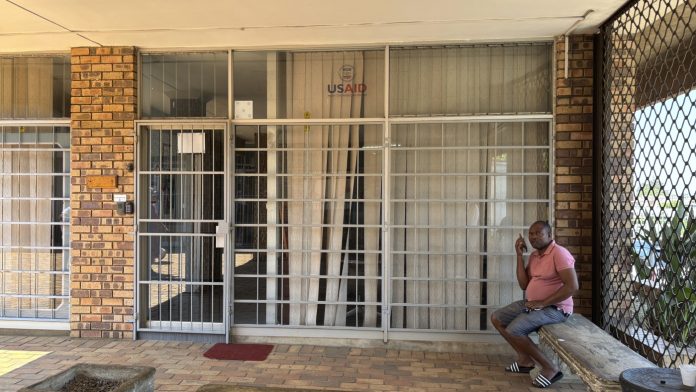A man sits outside the closed Isizinda Sempilo clinic in the Johannesburg township of Soweto Thursday, Jan. 30.
Alfonso Nqunjana/AP
hide caption
toggle caption
Alfonso Nqunjana/AP
JOHANNESBURG — Four days after President Donald Trump signed an executive order freezing almost all U.S. foreign aid, an email landed in Claris Madhuku’s inbox in rural Zimbabwe. Stop all activities immediately, it said.

The message confirmed Madhuku’s fears that Trump’s return to office might affect his organization’s efforts to save African girls from child marriages.
Many Africans had known that Trump’s “America First” outlook meant their continent was likely to be last among his priorities. But they hadn’t expected the abrupt halt to foreign aid from the world’s largest donor that stops money flowing for wide-ranging projects like disease response, girls’ education and free school lunches.
Even after global outrage prompted some exemptions to Trump’s order, sub-Saharan Africa could suffer more than any other region as most global aid pauses 90 days for a spending review. The U.S. gave the region more than $6.5 billion in humanitarian assistance last year.
For Madhuku and countless others, the damage has been done. His Platform For Youth and Community Development is one of hundreds of small non-governmental organizations in Africa that receive assistance from the U.S. government — and ultimately from the American people — to do good work.
Without U.S. aid, Madhuku’s group can’t give around 100 volunteers allowances for food and public transport as they do outreach seeking to keep girls in school and out of early marriages.
“We had to stop everything, no warning, no time to adjust,” Madhuku said. “I appreciate that Trump might have some justification in trying to account for American taxpayers’ money … but it has caused disaster here.”
The world’s most successful foreign aid program
For many in Africa, thoughts immediately turned to arguably the world’s most successful foreign aid program, the President’s Emergency Plan for AIDS Relief, or PEPFAR.
Over two decades, the program with bipartisan support has been credited with saving more than 25 million lives, the vast majority in Africa, the continent it was designed to help most.
“The world is baffled,” the health minister of South Africa, the country with the most people living with HIV, said after the U.S. freeze on aid.
The minister, Aaron Motsoaledi, said the U.S. funds nearly 20% of South Africa’s $2.3 billion annual HIV/AIDS program through PEPFAR, and now the biggest response to a single disease in history is under threat.
More than 8 million in South Africa live with HIV, and authorities say PEPFAR helps provide life-saving antiretroviral treatment to 5.5 million people every day.
HIV patients are turned away
U.S. Secretary of State Marco Rubio has announced that programs offering “life-saving” assistance including medicine, medical services, food and shelter would be exempted from the aid freeze, though what qualifies is not immediately clear.

The United Nations AIDS program said many organizations receiving PEPFAR funding had closed due to the aid pause and there was “lack of clarity and great uncertainty about the future.” More than 20 million people globally receive HIV treatment with PEPFAR support, UNAIDS said.
In South Africa’s largest city, Johannesburg, and elsewhere, PEPFAR-funded facilities were still shut days after the exemptions were announced and HIV patients were referred to government hospitals and clinics.
In Johannesburg’s largest township, Soweto, two workers at the PEPFAR-funded HIVSA center turned patients away. And a notice at the renowned Wits RHI Key Populations Clinic, which serves adults and children living with HIV, read: “We apologize for the inconvenience this causes.”
Delays could be dangerous
Experts said the effects on HIV programs remain unclear but the consequences could be swift, even dangerous.
“We need to know a lot more before we can say people won’t die directly because of the pause to funding,” said Charles Kenny, a senior fellow at the Center for Global Development in Washington, noting that while the waiver should cover HIV drugs, HIV diagnostic tests




